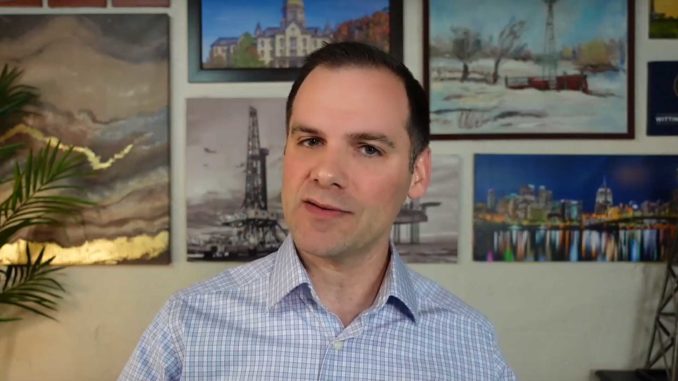

Joe Sinnott, Witting Partners and the host of The Energy Detox Podcast, joins Jason Spiess to talk about laying eggs in business, how to communicate internally and why leadership needs to step up their humanity game right now.
Below is the transcript from the interview.
Jason Spiess
Let’s head over to the Zoom line where we’ve got Mr. Joe Sinnott, on the line with us. He is the executive coach, the CEO, the founder of wedding partners. He’s also the linguistical voice the silver tones, if you will, behind the energy detox podcast. Are you a Notre Dame graduate too?
Joe Sinnott
In addition to all of those things, I am also a Notre Dame graduate. Yes.
Jason Spiess
Okay. So you’re not just a fan, but you are a graduate too. I assume you were by, you know, your posts and our conversations, but I guess I’d never really asked you that before. He’s coming to us from the Marcellus shale plays. So, you know, we got a lot happening in the world. You know, we got politics, we got inflation. We’ve got companies that are you know, reinventing themselves, you know, oil companies dropping the name, oil, putting the name energy in there. Boy, we got a lot of places to start. I’d like to start with the election. You’re out of Pennsylvania. Did you have any key elections when it comes to either the energy world or just kind of the economy itself? Mr. Joe Sinnott, first of all, how’re you doing?
Joe Sinnott
I’m doing fine. Maybe a little tired from staying up last night and watching some of the results coming in from the election. In part because here in Pennsylvania, we did have a pretty key race in the control for the US Senate that being between Dr. Oz on the Republican side and John Fetterman on the Democrat side.
Jason Spiess
Dr. Oz as in the guy from TV? That same
Joe Sinnott
Dr. Oz was on the ballot yesterday here in Pennsylvania. Yes.
Jason Spiess
Well, let’s see what the modern day Jesse Ventura has done today. Because you know, in all honesty, Jesse, the Body Ventura kind of set it off with some of these rogue celebrity campaigns. I suppose Ronald Reagan was kind of the handpicks celebrity started that whole thing under a controlled establishment. So Dr. Oz, he was here Republican independent. How did he do? And tell me about how to Dr. Oz and up on the ticket in Pennsylvania responsible for your livelihood?
Joe Sinnott
Well, you Well, you brought up the celebrity factor. And one of the reasons that he wound up on the Republican side of the ticket was because of another celebrity who also happened to be president for four years that being Donald Trump. So Donald Trump threw his weight behind Dr. Oz and the primary and Dr. Oz squeaked out a narrow victory in the primary and again, wound up on the ballot yesterday and are here in Pennsylvania and not just yesterday, but for the I think six weeks prior to yesterday with early voting, and he did not emerge victorious. He lost by a couple percentage points. Obviously, results are still trickling in, but it looks like he he lost on the order of maybe two to three percentage points to John Fetterman. His opponent on the other side.
Jason Spiess
Is Fetterman. A pro energy a? Let’s get rid of it and start over energy. I don’t even know what to call that side, I guess. How was he viewed by the energy world?
Joe Sinnott
I would say he’s viewed with skepticism. And that might be putting it nicely. He’s kind of gone back and forth. On the Record, as you know, is the case for many politicians, of course, and had a pretty noteworthy appearance about two weeks ago during a debate where he was challenged on his prior fracking position, which was pretty clear. An interview he gave several years ago where he said he opposes fracking and then had to stumble his way to to an answer or a response to that which didn’t really came, thanks, in part in fairness to the stroke that he suffered a couple months ago. But that’s a whole nother story that turned out to perhaps not play into the results last night as as some thought it might.
Jason Spiess
Let’s transition over to the world of energy and the way that we like to take some other stories of regular life of other life and kind of assimilate it and compare it if you will. And last weekend, Notre Dame defeated your alma mater defeated Clemson right after Clemson was ranked for in the college football playoff rankings thing that brand new they came out with, I didn’t even know they had a new BCS computer ranking until this year. And of course, we got controversy right out of the gate because TCU wasn’t in there. And Alabama wasn’t number one, even though they had a loss and you know, the usual and so except Boise State being replaced with TCU this year. So this year, Clemson is the first one to go down. And it’s by Notre Dame who really pulled a big upset at home and today’s existential executive coach question for you. Mr. Joe Sinnott, is this when you’re ranked as the as the favorite so When you’re ready to go to a trade show, when you’re ready to go to a business meeting, and you get there, and you lay an egg, you just stink up the room, nobody shows up to your party, the whole whatever you want to say it, man, because you know, life’s over, right? Essentially, Clemson is out of it. How do you tell your troops, there’s still a game to play, we still have to move on. Because a lot of times for people, you know, they look at life, the way people look at college football, if I don’t win the whole thing, well, hey, I’m just gonna tank it and not even try that hard. You know, hey, we showed up to that trade show. We checked every box. I didn’t get the clients. I thought, I’m gonna not try very hard. You get what I’m trying to say there. Joe Sinnott?
Joe Sinnott
I think I do. And it’s funny, because from a football standpoint, it’s it’s very similar to a lot of the Monday morning or Wednesday morning quarterbacking after the election last night. So the Republicans went in with a lot of confidence and turned out that they did not emerge victorious, at least, you know, depending on how you define a victory. So, you know, there’s a lot of parallels there to say, hey, look, are you just trying to look for silver linings? Or are you trying to, you know, set yourself up for future success, you’re dealing with individuals, like you are in a football team, and you also have the team component, and you have the fan component? So to answer your question, one of the best things that a leader can do when you know, he or she has laid an egg or team has laid an egg is first and foremost, to come back to the facts, like stick with what’s known, you know, try to, you know, you can acknowledge emotions and disappointment that a team might feel or a political party might feel or an individual might feel. But at the end of the day, you know, stick to the facts start at least start there, right? You know, here’s what’s known, here’s what went wrong, here’s what went right, here’s a path forward, here’s the next step, here’s the next game that’s on the schedule, at least start there. Now, that’s not to say, you know, you should dismiss a motion and dismiss feelings and all of that, of course, and in the world of coaching, you know, sometimes those blend together, although, you know, blending the world of engineering and energy and sort of corporate America, which was my former life, to this world of coaching, which can be a little bit softer. Sometimes I think I sometimes tend to maybe draw on that engineering hat a little bit more than maybe some other coaches. But, but that is my approach, start with the facts with what’s known. And then you can kind of navigate the emotional piece, Jason. So again, it’s sort of a universal piece. And the one other thing I’ll say to Jason is to beware of excuses, again, whether it’s in politics, whether it’s in sports, whether it’s in business, a lot of leaders, unfortunately, will default to excuses. And quite frankly, that’s a death knell for an organization for a team for, in some cases, you know, a political party, or at least a regional, you know, political entity. So, be mindful of excuses, stick to the facts. And that’s a good way to at least start things, you know, to pick up the pieces, if you will, and head into the next game or the next election or, you know, the next quarter, if you will,
Jason Spiess
well, as long as we’re at Notre Dame, we might as well go to, you know, chapel and pick out our Bible and read that oftentimes, when the ground is rocky and the grounds are thorny. You have to go to a new field in order to save the field. And sometimes when your leadership is just full of excuses, if you’re an employee, that’s a little hard at times, and a lot of times employees don’t like leaving they don’t like starting over because it’s it’s scary and and everything else. How is it expected right now? It seems like every day somebody I know on LinkedIn or social media is announcing a brand new job and some of these other things. We’ve got a lot of leaders out there right now making a lot of excuses. I don’t know if you want to tackle it from the employees side, like I tried to do with that really bad biblical reference, or the I tried bad. Hey, Dad, hey, all winters. Let’s just put it that
Joe Sinnott
way. Well, the funny thing is, you know, you started using sowing seeds and stuff, but Notre Dame switched artificial turf, I think about seven or eight years ago. So that so that analogy was lost on me there. But
Jason Spiess
I don’t even think I got one on a 10 on that one. So but I know there’s a Bible verse somewhere about you got to leave if there’s too many rocks and thorns out in the garden. So I know that but really, from a management’s perspective, that’s hard to pick up on until you lose your fifth good employee, or from an employee standpoint, it’s hard to make change in a culture if you’re just an employee’s. So let’s talk about that. How do you know or how do you go?
Joe Sinnott
Well, again, I guess, you can attack that both ways. Right? You can take it from the employee perspective and the sort of what do you do and how do you navigate and obviously you can look at it from the leadership standpoint, you know, from the company standpoint, and I think starting with the company standpoint, especially again in light of the election last night, and And again are in the heart of college football season right now. The key is introspection from the leader, self awareness for a given leader or a coach about how, you know that individual coach is perhaps limiting the success of his team. That’s one of the toughest things to do for many leaders, especially as they ascend the ranks and have had some measure of success is to pause and say, Hey, wait a second, you know, maybe, maybe it’s me, or maybe it’s decisions that I’m making. And maybe I’ve gotten to the point where those individual employees, you know, they’re not speaking up, they’re not calling me out when things are going wrong. And what’s interesting, again, from a political standpoint, is you’re seeing this a lot, especially on the Republican side of the equation with Donald Trump. So on the heels of last night’s non red wave for the Republicans, a lot of people are saying, well, you know, is Trump to blame for this? And is Ron DeSantis, perhaps the future of the Republican Party, because he won handily in Florida. And without getting into the, you know, the analysis in the weeds on that, you know, bringing it back to a college coach, right? When a college coach has maybe plateaued? Or isn’t seeing success? Is he saying, hey, wait a second, you know, what am I doing wrong? And is he empowering those around him? To call him out on it? And that brings us to the employee side of the equation? Does your employee base? Or do you as an individual employee? feel like there’s a mechanism to say, hey, how might we do things a little bit differently? Or have we considered this not just gripes? You know, nobody just wants a constant gripe session, but as an individual employee, are you asking yourself, what are all the ways to make your voice known? Again? What did people do yesterday? They voted to make their voice known, of course, but in a company, what do you do? So some people vote with their feet, of course, and walk out the door. And that’s one approach. But that doesn’t obviously, you know, eat to sustainable change within an organization. So it’s up to an individual to say, well, what are the avenues? Is it through perhaps human resources? Are you having open conversations with your direct leadership? Or perhaps with your fear peers? Do you have, you know, allies within the company or mentors, a lot of employees, unfortunately, Jason will take a short sighted approach where it becomes as black or white, well, I either have to stay or go. And, you know, they feel defeated, as if they can’t lead to any change. And quite frankly, in many cases, that that’s due to a lack of innovation. It’s due in part because the leadership and the culture, you know, has not engendered a spirit of giving feedback and such but, again, that could be an excuse for an individual employee, who refuses to say, Hey, how can I make a difference today? So I got maybe a long answer there. But hopefully it covered sort of the the full spectrum there from the very top of a company down to the individual employee that might be inclined to walk out the door and, and look for greener pastures that were put in place with some miraculous seed that can still grow on astroturf.
Jason Spiess
Notre Dame and Coors probably best known for their unbelievable contract with NBC. No, I’m just kidding. Is Rudy the movie Rudy that came out of there where underdog, feel heartwarming story. moral victory, if you will, for the university. No idea if anybody wants to last that day, but Rudy got him there. And he made everybody feel good. So my question to you is this, whether it’s Notre Dame this year, who the sports writers said the season was over after week three, because I think they had two or three losses at that point. So with your your Notre Dame yesterday, when they are two days ago, whatever it was sucked last week when they beat Clemson. Really, that’s a moral victory at the end of the day, maybe a better bowl placement, so they might get a few more bucks and that sort of thing. But for a team that was expected to make maybe $10 million, at the end of the year, making one or two isn’t, you know, a victory for them. So this would be a moral victory in the world of energy. Sara Stogner out of Texas, she ran for the Texas Railroad Commission. Without any money behind her. She ran strictly as a social media campaign. She took second in the primary got so many votes, she actually did a runoff, where she ended up losing to Wayne Christian who’s the Texas Railroad Commission. Ironically, this is it’s so funny, when I did a story on her show I wrote after a successful loss because I viewed her campaign as one of the most successful campaigns in modern American history. Here’s somebody who’s spent $0 until the actual election, but she spent $0 and got her runoff vote that’s really really good. So do we even have moral victories anymore? Because actually, when I posted that I got trolled. People were saying on social media. How can you have a successful after losing six successfully or some, it was a successful loss that was it after a successful loss. That was what the word was. People were trolling me after my contradictory term and I’m going, No, you can actually have a successful loss. It’s called a moral victory. So, do we have moral victories anymore? Are we so hard wired that if we don’t get the gold medal, it sucks, man.
Joe Sinnott
I think I mean, for one, I tend to be skeptical of the term moral victory because it seems somewhat defeatist. Right? It’s like you’re you’re searching for something. And you know, same thing, you’re looking for a silver lining, again, whether from a political standpoint, from a sports standpoint, it could sound a little bit like well, gee, you know, if you if you’re my leader, I don’t I don’t want you talking in those terms. Again, like we said before, I want to know what’s next. You know, I want to know what the path forward is how we can build upon things. I will say, however, Jason, that I am a fan of accentuating the positives, though. And I know that it’s a it sounds the same, perhaps. But I think there is a distinction there first, there’s an acknowledgement that yeah, there are positives, and it’s okay to emphasize them, instead of just searching for a moral victory and trying to kid and kid yourself into thinking that you What did you say, you know, what am I losing or whatever. So, I guess from a sports standpoint, from a leadership standpoint, successful a successful loss.
Jason Spiess
I tripped myself up three times. And I finally figured it out. But yeah, anyway, sorry.
Joe Sinnott
Well, here, but here’s what I mean, from a practice, again, put on my engineering hat here. From a practical standpoint, one of the reasons that moral victories don’t hold a lot of weight today is because we are in this, you know, headline driven world, right? This, you know, Instagram, Twitter, Tiktok world, and it can be very difficult for fans of of any sort, again, whether it’s an electorate or fans of a sports team or employees, it can be very difficult for fans to look at the long term vision approach progress. And so too, for leaders, right, because they’re trying to adapt to their fan base. So they need to think short term. And so you know, to say, you know, you have a moral victory a lot of times that implies that there’s going to be some long term gains. And again, last night, the maybe the one silver lining for Republicans is that Ron DeSantis, again, did tremendously well in Florida. And people say, hey, you know, that there’s reason for hope there you can, you can build upon that it gives some sort of clarity to the future of the party. With Notre Dame, you know, when they lost early on to Marshall not upset, you know, they were 20 point favorites. And it was tough to find a silver lining or a moral victory at the time. But you fast forward to today, and you say, hey, wait a second, you know, this team probably is stronger because of it. Nobody wants to have those three losses now. But you know, it kind of depends on your perspective, if you can look long term and you’re a leader coming back to how do you how do you recover, when you dropped the ball figuratively, it’s, it’s having a clear long term vision that you can convey to people. The problem here today, Jason, and you know, this is the sort of the crux of what I do, you know, fueling sustainable leaders, that’s the tagline for my business, the antithesis of sustainability is only relying on the short term, hey, I either won, or I lost. And that’s it. And I’m gonna hang my head if I if I lost and not being able to translate those, quote unquote, moral victories or successful losses, and see how they fit into the big picture. So again, it’s a it’s a delicate balance at times, which many times in the world of coaching, it is a delicate balance. But by and large, that’s that’s the issue, Jason is that we are in a world where a lot of people just based on social media, based on how we ingest information, have a difficult time looking more than one game down the road, so to speak. One of
Jason Spiess
the issues I had in my former industry Well, I guess I’m currently in it the media, okay, because I the crude life, I guess, technically and ESG. You and the other platforms I’m a part of those are technically media brands. We just happen to cover a specific industry. And we went through the newspaper paradigm shift about 10 years ago, 15 years ago, where the Internet came in. The government really bailed out, Google, Yahoo, Facebook, Twitter, a lot of those social media companies and platforms really got the lion’s share of any sort of banking too big to fail money, I think was was what was coming in at that time. And the newspapers kind of, were left to fend for themselves. And one of the things the newspapers did was they focused on their printing press, because that is what they made their money on for years and years and 100 years. 100 years ago, the newspaper had a monopoly. And when they focused on their printing press, they had to put a building around it, you had to have ink, you had to have an engineer, when you start doing the ESG, kind of in a vacuum supply chain of the printing press, that’s what’s known as a sunk cost. When you start having to, you know, work for the printing press, the printing press controls you. And now that’s starting to happen in restaurants where the fryer in that big grill that they used to have, well, now with a lot of these air fryers and smoothies, I mean, now you go to airport, man, they got a whole restaurant and a kiosk now. So you’re starting to see a little bit more flexibility with what these traditional sunk costs were. So organizations are having to think differently. But one of the first things they have to identify and identify is a sunk cost. And in the newspaper industry, eventually they understood it was it was the printing press, and they had to either outsource it or do some sort of printing share thing, because that industry was going away. You know, and the travel agents when the internet came away, boy, they went away overnight. So they had to go, there sunk cost was, well them. So how do you identify what your sunk cost is, for example, like, a lot of times it’s an employee. And when an employee will not change, they become a sunk cost, because now they start requiring more investments in order to enable their bad behavior. And this can become very problematic inside of an organization, Joe Sinnott, it’s very difficult to identify a human as a sunk cost. But if they’re toxic in your organization, they can be just like, What happened to the newspaper industry? And just like what happened in the housing industry? And just like what happened, you know, to the what was the other industry I gave? Oh, the restaurant industry, how that’s starting to change. Talk to me a little bit about that, when when you’ve got toxic environments when it is a sunk cost, and you really have to make some major, major changes, because the sea of change is coming, whether you like it or not. Okay, there we go. That was a really long way to ask the question, did you fall asleep? Are you still awake or
Joe Sinnott
didn’t fall asleep? And in fact that again, it’s an important question, and there’s one.
Jason Spiess
There’s one, you know what it sports quarterback change? They’re done one sentence? Yeah, there
Joe Sinnott
you go. There’s your parallels. Well, well, well, there you go. So a couple things on that. So whether it’s a quarterback change or toxic employee, the one of the simplest approaches, Jason is to ask the leader ask the coach, if you will, hey, what what would it feel like if this person were not your quarterback? Or what if this employee walked out the door tomorrow? You know, what, what would that look like? How would that feel? It’s a super, super simple question. But it’s one that a lot of people don’t ask, or they only ask after lots of banging your head against the desk and hemming and hawing and making excuses one way or the other and going down the sunk cost approach, right? Well, this person has tons of experience or this or that or you know, just needs to grow or develop, say, hold on. That’s fine. We can we can analyze or overanalyze all you want but let me just just ask this right now. What would it be like? If you bench that quarterback? And brought the other one in today? How would you feel? It just changes the way that that person thinks? Right? It gets them to envision life? If that change were, you know, if they didn’t have a choice, for example, you know, some quarterback unfortunately gets hurt. And that person needs to try to and how would it change the game? Same thing if that toxic employee voluntarily, you know, hit the Powerball hit the $2 billion Powerball jackpot from the other day and walked out the door? How would it feel? And I I will say that maybe not on the sports side, but certainly on the business side, more often than not, it’s an easy answer, say, Well, I’d be refreshing and you know, that give someone so a chance to move up? And yeah, we’d be able to, to scrape by. And that’s a very different answer than when they’re in the in the thick of things and they’re trying to look at things so black and white and saying, Well, you know, this person, and that’s what we pay them it will cost you know, this amount of money to hire somebody else and backfill and we’re getting into holiday season and you know, we’re gonna have to get some coverage there. Just stop, stop, envision what it would look like if that sunk cost. If that sunk individual that sunk quarterback, if that sunk printing press, if that sunk deep fryer, whatever, isn’t there? And you will find that that shift in thinking elicits a whole different answer than you would get if you went down that, you know, over analytical path.
Jason Spiess
That’s one of the things that I like to try to. In fact, I’d like to know your response, your reaction and your professional opinion on something like this. Don’t Bill Me either, is that when when it comes to that transition, you know, we just went through the big crew shift in oil and gas. And it’s something like 75 to 80% of the current industry, you know, retired and then new ones came in. And in some cases, you’ve got, you know, the shadow leaders, so they didn’t really retire, they retired in theory, but they’re really just kind of controlling behind the scenes, which is so easy to do in today’s digital world. So easy to do, you can have facetimes, you can have what’s ups, you can have all kinds of ways to track it, you can have all kinds of ways to not track it. I can tell you, if I if I gotta add $1 Every time I heard a current person in leadership under the age of 40, say, Oh, I wouldn’t? I don’t know. So and So wouldn’t like that. And so and so as somebody who retired five years ago, okay, so there’s a lot of that happening. The other thing I wanted to I wanted to get your opinion on is, is this youth movement? Okay. One of the reasons people bring in youth movement is because they need fresh ideas and new blood and that sort of thing. I’ve never agreed with that. I’ve never agreed with that. What I’ve always tried to say is that instead of bringing in a youth movement and falling into a group thing right out of the gate, go to find people that are open minded, and that can actually see through the process. Because when you’re transitioning from a coal boiler, to solar panels, you need somebody that can actually see through the logistics all the way to the transition lines, rather than somebody that can say, hey, I can go to that conference. Hey, I can go do that. Do you understand what I mean, Joe? Because right now, a lot of a lot of companies are going through some major expensive changes. And all they’re being told us Oh, thank you young. No, no, don’t think young. Think for yourself. Anyway. Sorry, I got political there for a second. So just the idea of youth movement versus open minded movement, I guess maybe might be the way to phrase it.
Joe Sinnott
Yeah, honestly, I think you’re spot on there. Jason. I don’t know. I don’t know how much I have to add to that. Other than I did see an anecdote the other day from from a resume, Coach resume writing agency, who said that a job description came through and the job description called for somebody who was young and energetic. I think that was the term. So obviously, a whole bunch of no no’s from from a hiring standpoint, from a legal standpoint to, to, you know, put young and energetic as if older people can’t be energetic. But to your point, Curiosity is more important. And I think the answer to for both sides of the equation, whether it’s people who are continuing to adhere to how something was done for years, or someone did something for years, solving that problem, and also solving perhaps the short sighted idea that well, yeah, we gotta get these enthusiastic people who can, like you said, you know, go to a conference and do this, and, you know, work till midnight, and all of these things. The simple retort to that is, so what, so what, what, what does it do, so that person is going to go to a conference, or whatever, or work late, or you’re going to, you’re going to check the box and do things the same way that they’ve been done for the last 10 years. So what, and being able to ask that tactfully. And from a place of independence, which, again, is the role that I’m fortunate to play, quite frankly, I mean, I love being independent, I won’t say not biased, I’m gonna certainly have my biases when it comes to, you know, business and things that have worked. But you know, I tried to set those aside. And if nothing else, I am independent. So I can ask that question tactfully. Well, so what? How did you get to that point? You know, what is it about a younger person or a more energetic person, that’s going to lead to better bottom line results? Because a lot of times the results that people are talking about to hey, look, if we bring in this young and energetic person, we’re gonna do XYZ, well, x, y, and z tend to be short sighted results, again, to your point, hey, we’re gonna have greater exposure at this conference or on social media or, you know, whatever. Okay, well, so what how does that translate into your company’s bottom line? So, again, just like before, asking a simple question, hey, what would it be like if you got rid of this toxic person? What how would life be? Another simple question. So what what does it do for you? And, you know, sometimes the person will have a quick answer if it’s a decision maker and many times or you’re going to have to do a little introspection and say, Hmm, I guess I should answer that before we make hiring decisions and process decisions based on short sighted or antiquated views.
Jason Spiess
Joe Sinnott is our guest just a few more minutes left here with the executive coach. The podcast host, the business owner and the Marcellus, magnificent Marvel, I’m trying to figure out a nickname for you there. It didn’t work on the fly. But hey, this is live, nothing ever that happens live is bad. It was meant to happen that way. So the question I had for you has to do with loyalty, and idol worshipping, because there’s a fine line between loyalty and idol worshipping. And what I mean by that is, a lot of times organizations look for loyalty. A lot of times employees feel if they’re loyal to the organization. That is what makes for a good employee. For me, Joe Sinnott loyalty is when my values and ethics match someone else, I become loyal to them until they no longer match, then I have to go and walk away, or I have to go find different loyalties. Because if I continue to walk down that path, then it becomes idol worshipping. Now I just worship them because of who they are. There’s no longer a loyal attachment anymore. And I think that line has kind of blurred a little bit. You of course, being the Notre Dame grad, you know exactly what I’m talking about. When I talk about idol worshipping, you’ve read your Old Testament with the 15, crash 10 commandments, one of the greatest scenes ever. And I think that’s the history of the world by Mel Brooks, when Moses brings them down the 15, crash 10 commandments. Talk to me a little bit about that fine line between loyalty and idle worshiping in an organization because I don’t think a lot of times the average current employee understands that a lot of times loyalty as being loyal to yourself, Joe?
Joe Sinnott
Yeah. And well, again, there’s a there’s a big question there that we can spend an hour talking about in terms of loyalty to oneself and, and, you know, using self interest to not just move yourself forward, but move your team forward. And I think that’s going to be my answer to that question, which is, are you loyal to someone who has you and your team’s best interest in mind? Because many times when you move into idol worship, you forget about that team aspect. So if you’re, you know, if you’re worshiping a leader in a company or a political leader, and again, you know, this is a political comment here, from a Donald Trump standpoint, you’re getting to that point now, where it’s, Hey, wait a second, you know, is this cult of personality that is driving people to be enthusiastic about Donald Trump? Or is it his policies? Is it his commitment to the country, or if you take the political side of things to his party, the Republican Party, and when people are in sort of this, this phase of idol worship, they stop asking questions. And that’s it. That is the death knell for any organization for any project for any team is when people stop asking questions. And when you’re in a state of idol worship, whether you’re worshiping somebody, you know, in the C suite, whether you’re worshiping a coach who could do no wrong, that’s when things go south. And again, you know, unfortunately, we’ve seen instances, right, from a, from a coaching world, in a sports world where people, you know, they say they’re turning a blind eye to things that are going south, you can look at Penn State, for example, obviously, and things that went down there, or, you know, Michigan State and gymnastics thing and all, you know, all this horrible stuff. But it’s not just people turning a blind eye. It’s people stopping asking questions, because they assume that this leader has their best interest in mind. So the antidote to all of that, Jason is to keep asking questions. Is this person doing what’s best for the team to keep moving forward? And if the answer is, I’m not sure, let alone No, then that needs to be addressed. And I guess a final note on that, of course, is from an individual leader standpoint, many leaders unconsciously unwittingly, put themselves in a position of idol worship, and they encourage people again, maybe not intentionally, but they encourage people to stop asking questions and say, well, trust me, trust me, that’s a sign of loyalty, trust me, I will take care of everything. And when you can kind of hold a mirror up to leaders and let them see how they are allowing themselves to be worshipped in this sense. It can be a game changer and humbling in many cases, but who’s holding up that mirror? That’s, that’s the open question, who’s who’s holding up the mirror? And, and again, I mean, that’s one of the things I enjoy doing quite frankly, as a coach now is holding up that mirror and kind of letting them see it for themselves and, and not having me have to hop on my soapbox and and, you know, directly relay all of my observations.
Jason Spiess
In fact, I think I think we have our topic for next time. It’s the entitled enablers. You And that’s the best name I can come up with right now. And that’s all those people that enabled the Penn State and the Michigan State, you know, atrocities happen because Joe, you know, as well as I do is that when there are people that do not want to idol worship anymore, and they want to start questioning loyalties and start questioning where the ethics went awry, there are people that snapback right away. And those aren’t people in charge, those are the entitled enablers. And that’s a, that’s a whole different style of leadership, because there’s a way that people can stop doing that. And then also, you know, come out on the other side and decide, you know, what, I no longer want to enable this destructive behavior in my organization, even though it’s coming from my boss, or even though it’s coming from my superior, I no longer want to enable this because I don’t like looking in the mirror anymore. You know, that type of thing. Because a lot of people are going through that right now. They’re starting to realize what they helped create, and what they have been enabling, and some of the lives, you know, that have been destroyed because of it, basically. So I think that’s gonna be a fun topic. If you’re willing to talk about that. There
Joe Sinnott
is no topic that I’m unwilling to talk about with you, Jason. It’s always entertaining. And somehow we always managed to weave together seemingly disparate topics, and I think make some sense of it. I don’t know. I guess that’s for the listeners to decide. But yes, that sounds like a great follow up takut topic for our next conversation.
Jason Spiess
Much better than who’s better meatloaf or Miley Cyrus, which I still am all about having a spirited debate about that. Well, how could people listen to your energy detox podcast? How can people give you some business and who is your target customer Joe Sinnott?
Joe Sinnott
Well, the podcast is on all your favorite podcasting app. So you can go ahead and search the energy detox or go to the energy detox.com. As far as getting a hold of me and reaching out certainly LinkedIn is, is always a fun option or head on over to wedding partners.com WRI te T I N G partners. And as far as target audience, target client, the folks that I work with the most and that I enjoy working with and that see the most bang for their buck. It is energy industry companies from an upstream midstream service side and downstream standpoint. And companies that have you know, a lot of emerging leaders, going through some measure of change and transition, which is a lot of companies these days, and who are looking for an independent resource with the experience, the knowledge, the background, and the insights to help existing resources, maximize their potential. So again, I don’t come in and try to reinvent the wheel Jason, and when, you know, companies are looking for people to come in and help them reinvent the wheel, I’m not that guy. But when you feel like hey, you know what, we got some talent here, we want to move them to the next level, and make sure that they are a positive influence on the people around them, and can continue growing and building solid succession pipelines, and making best decisions making quicker, faster, better decisions, then, you know, that’s what I enjoy doing. That’s who I am, and happy to have a conversation with folks who are in need of that type of boost for their organization.
Jason Spiess
And one final thought one final question is I see you are moderating or hosting a number of different panel discussions for it looks like the Society of Petroleum Engineers. Is that what what I’m seeing talk to me about that, that leadership role you’ve been taking on.
Joe Sinnott
So I have been moderating leading conversations for Society of Petroleum Engineers, they have tech talks, one or two Tech Talks per week. And a lot of those are new technologies, new services that are out there. So you know, asking questions, getting into some of the technical details on some things. And ultimately, just like my role is to help sort of the people side of things, helping elicit an understanding of how some of these new approaches, new technologies can help shift things positively within organizations, so very much enjoying that you might also see, you know, other talks in moderation publicly, you know, different forums, different industry groups, you know, enjoy going out and leading leadership workshops or conversations or seminars, or in some cases, career development, seminars, and workshops, and speeches or whatever. And ultimately, all of that Jason is really just sort of a public view of what I do internally for a lot of companies. So beyond the coaching, I like weaving in the business side of things, the technical side of things, in some cases, you know, what’s going on in the world around us from a political standpoint, from a sports standpoint, I enjoy weaving all those together with the leadership challenges that individuals are facing and Again, when I have an opportunity to do that publicly, I’m always happy to take advantage and give back. But again, that’s basically a some insight into what I do for a living, which in many ways is ask questions. So long winded answer there SPE tech talks, again, mostly on Tuesdays and Thursdays. I’m one of a couple of, of hosts for that, that rotate through, and very enjoyable experience and opportunity and certainly a way for me to contribute more directly to the Society of Petroleum Engineers, which I’ve been a part of for 15 or so years.
Jason Spiess
All right, man, hang on the line. I’m gonna talk to you when we go off the air. But as far as the interview goes, I appreciate the time today and we’ll talk again next month. Okay.
Joe Sinnott
Sounds good. Jason, thank you very much. All right.
About The Crude Life
Award winning interviewer and broadcast journalist Jason Spiess and Content Correspondents engage with the industry’s best thinkers, writers, politicians, business leaders, scientists, entertainers, community leaders, cafe owners and other newsmakers in one-on-one interviews and round table discussions.
The Crude Life has been broadcasting on radio stations since 2012 and posts all updates and interviews on The Crude Life Social Media Network.
Everyday your story is being told by someone. Who is telling your story? Who are you telling your story to?
#thecrudelife promotes a culture of inclusion and respect through interviews, content creation, live events and partnerships that educate, enrich, and empower people to create a positive social environment for all, regardless of age, race, religion, sexual orientation, or physical or intellectual ability.
Sponsors, Music and Other Show Notes

Studio Sponsor: The Industrial Forest
The Industrial Forest is a network of environmentally minded and socially conscious businesses that are using industrial innovations to build a network of sustainable forests across the United States.
Weekly Sponsor: Stephen Heins, The Practical Environmentalist
Historically, Heins has been a writer on subjects ranging from broadband and the US electricity grid, to environmental, energy and regulatory topics.
Heins is also a vocal advocate of the Internet of Everything, free trade, and global issues affecting the third of our planet that still lives in abject poverty.
Heins is troubled by the Carbon Tax, Cap & Trade, Carbon Offsets and Carbon Credits, because he questions their efficacy in solving the climate problem, are too gamable by rent seekers, and are fraught with unreliable accounting.
Heins worries that climate and other environmental reporting in the US and Europe has become too politicized, ignores the essential role carbon-based energy continues to play in the lives of billions, demonizes the promise and practicality of Nuclear Energy and cheerleads for renewable energy sources that cannot solve the real world problems of scarcity and poverty.

Weekly Sponsor: Great American Mining Co
Great American Mining monetizes wasted, stranded and undervalued gas throughout the oil and gas industry by using it as a power generation source for bitcoin mining. We bring the market and our expertise to the molecule. Our solutions make producers more efficient and profitable while helping to reduce flaring and venting throughout the oil and gas value chain.

Join Podcasters from across the world and all walks of life as they unite to bring civil solutions to life and liberty.

Studio Email and Inbox Sponsor: To Be Announced

Featured Music: Alma Cook
For guest, band or show topic requests, email studio@thecrudelife.com
Spread the word. Support the industry. Share the energy.


